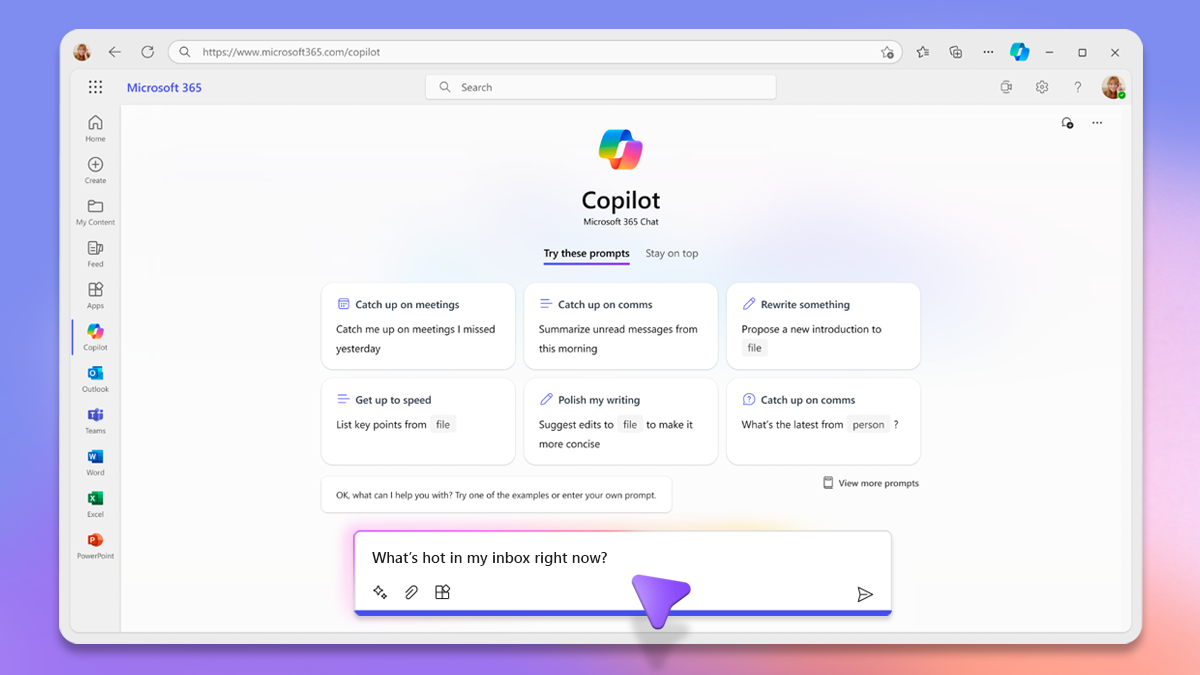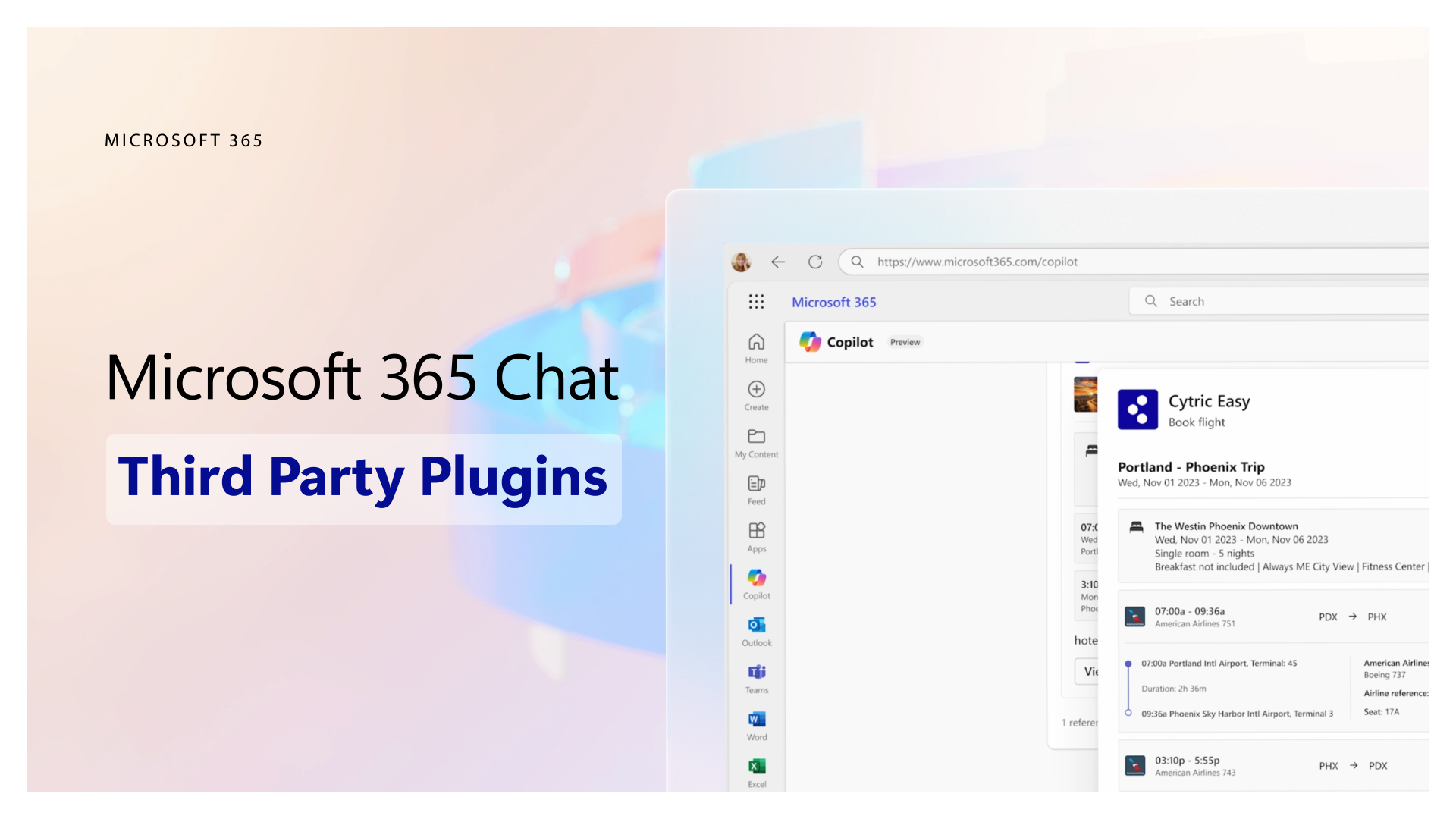Microsoft opens door to end-to-end AI with Copilot launch, 365 Chat
The firm is encouraging developers to apply natural language to their apps via plugins


Microsoft has announced a raft of new AI features for Windows 11, with firm dates set for the release of its generative AI assistant Copilot and expanded capabilities for enterprises.
In a flurry of product launch news, the tech giant revealed Microsoft Copilot in Windows, available as a side pane that users can use to intelligently interact with their apps, as well as a series of new features for its AI productivity assistant Microsoft 365 Copilot.
Chief among these was Microsoft 365 Chat, which Microsoft billed its “hero experience” for 365 Copilot. It is through this chat interface, via natural language prompts, that users could derive the most value from customized generative AI outputs.
While 365 Copilot leverages the power of OpenAI’s GPT-4 large language model (LLM) to perform tasks with speed and accuracy, Microsoft has been keen to stress that its real strength lies in its ability to use company metadata to inform outputs via Microsoft Graph.
“You got a glimpse of Microsoft 365 Chat in March, but thanks to rapid advances over the past few months, today we’re taking it to a whole new level,” said Colette Stallbaumer, general manager at Microsoft 365.
“Going far beyond simple questions and answers to solve your most complex problems at work.”
For example, Copilot is also now capable of mimicking a user’s distinct writing voice for emails, using a new feature called “sound like me”. As with many of Copilot’s features, the AI assistant leverages user metadata to securely gather contextual information on their writing.
Get the ITPro daily newsletter
Sign up today and you will receive a free copy of our Future Focus 2025 report - the leading guidance on AI, cybersecurity and other IT challenges as per 700+ senior executives
Microsoft had previously announced plans for developers and independent software vendors (ISVs) to bring plugins for their software to Copilot, and at the launch event announced that these will be accessible via Microsoft Chat.
In a demonstration, Stallbaumer showed Copilot being used to match a manager’s travel itinerary with that of their colleagues, using the prompt “find the travel itinerary that Casey shared in email earlier this week”.
Through a plugin with Amadeus’ travel and expense software Cytric Easy, Copilot was shown to access email and company data to find the right hotel and flight bookings, and give the user the ability to book through a simple pop-up window.

Other plugins will let users ask for reminders on unresolved tickets within Atlassian’s issue-tracking software Jira, pull together campaign data in marketing automation platform Adobe Marketo, or summon boards in the visual collaboration platform Mural.
Other firms are working on plugins for internal use. For example, Ernst and Young LLP (EY) is aiming to produce a plugin that allows workers to compare the revenues of EY member firms across time using natural language.
Full integration of Copilot within Windows 11 will come on 26 September, allowing users to summarize pages, draft text, or control system settings using natural language prompts.
Microsoft 365 Copilot, will be made generally available on 1 November, for $30 per user, per month.
Microsoft has encouraged developers to join the Microsoft 365 Developer Technology Adoption Program (TAP), which gives them access to feature roadmaps and product groups.
RELATED RESOURCE

Learn about what you need to know about potential data exposure from APIs.
Users will also be able to access Copilot Lab, a space where they can build prompts for Copilot and share them with co-workers.
Within this hub, accessible via its 365 Copilot and through a dedicated website, users are given tips on how to improve their prompts and are given examples of pre-made, effective prompts.
Satya Nadella, CEO at Microsoft, hailed what he branded a new era of computing “as significant as the PCs in the 80-s, the web in the 90s, mobile in the 2000s, cloud in the 2010s”
“Just like you boot up an operating system to access applications, or use a browser to navigate to websites, you will invoke a Copilot to do all these activities and more,” he said.
Since leaning into the generative AI wave with its landmark investment in OpenAI, Microsoft has revealed a family of products under the ‘Copilot’ brand, including to GitHub Copilot X, Copilot for Viva, and Security Copilot.
It faces increasingly stiff competition from the likes of Google and Meta, with the former leaning heavily into its own AI productivity tool for workspace Duet AI, and the latter having released its open source pair programmer Code Llama in direct competition with GitHub Copilot.

Rory Bathgate is Features and Multimedia Editor at ITPro, overseeing all in-depth content and case studies. He can also be found co-hosting the ITPro Podcast with Jane McCallion, swapping a keyboard for a microphone to discuss the latest learnings with thought leaders from across the tech sector.
In his free time, Rory enjoys photography, video editing, and good science fiction. After graduating from the University of Kent with a BA in English and American Literature, Rory undertook an MA in Eighteenth-Century Studies at King’s College London. He joined ITPro in 2022 as a graduate, following four years in student journalism. You can contact Rory at rory.bathgate@futurenet.com or on LinkedIn.
-
 Bigger salaries, more burnout: Is the CISO role in crisis?
Bigger salaries, more burnout: Is the CISO role in crisis?In-depth CISOs are more stressed than ever before – but why is this and what can be done?
By Kate O'Flaherty Published
-
 Cheap cyber crime kits can be bought on the dark web for less than $25
Cheap cyber crime kits can be bought on the dark web for less than $25News Research from NordVPN shows phishing kits are now widely available on the dark web and via messaging apps like Telegram, and are often selling for less than $25.
By Emma Woollacott Published